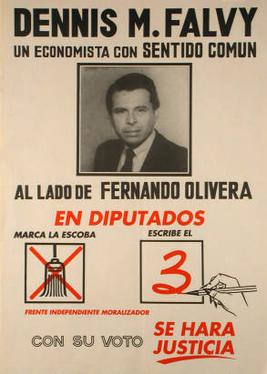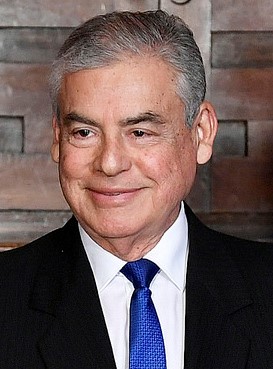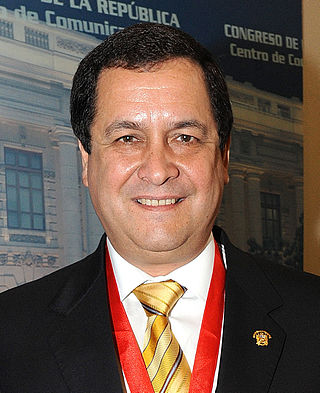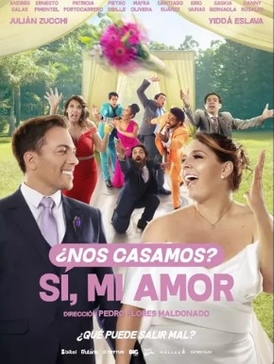Related Research Articles

Union for Peru is a Peruvian political party founded by Javier Pérez de Cuéllar, an ex-UN Secretary General, in 1994 to run for the presidency of Peru in the 1995 general elections. Originally a social democratic party, the party became the main political home of the Peruvian ethnocacerist movement in the late-2010s after a group led by former Army Major Antauro Humala joined the party. Humala later formed the Patriotic Front in 2018 and contested the 2021 general elections.

The Independent Moralizing Front was a Peruvian political party. At the legislative elections, 8 April 2001, the party won 11.0% of the popular vote and 11 out of 120 seats in the Congress of the Republic. Its presidential candidate at the elections of the same day, Luis Fernando Olivera Vega, won 9.9% of the vote. It was allied with former Peruvian president Alejandro Toledo's party, Peru Possible.
The Broad Front for Justice, Life and Liberty, or simply Broad Front, is a major political coalition of parties, political organizations, social movements and activist citizens of Peru whose main objective is to consolidate the different leftist, progressive, socialist and communist sectors.

Peru 2000 was a Peruvian right-wing political alliance that fielded candidates for the 2000 general elections. Alberto Fujimori and his political allies ran on the Peru 2000 ticket in which, Fujimori was triumphant in his second re-election as President for a third term amid public discontent.

Cesar Acuña Peralta is a Peruvian politician and entrepreneur in the field of education. A controversial figure in Peruvian politics, he is the founder and leader of the Alliance for Progress party, which has achieved recognition for being the first party of provincial origin to gain electoral popularity at national level since its foundation in 2001.

César Villanueva Arévalo is a Peruvian politician who was the prime minister of Peru from April 2018 to March 2019, and previously served as prime minister from October 2013 to February 2014. In 2007, he became governor of the San Martín Region. He was sworn in as prime minister by President Ollanta Humala on 31 October 2013, and is affiliated with centre-left parties. In the 2016 general elections, he was elected congressman representing San Martin under the Alliance for the Progress of Peru of César Acuña.
Julio Armando Guzmán Cáceres is a Peruvian economist, politician, and leader of the Purple Party who ran for President in the 2021 general elections getting just over 2% of valid votes. He was formerly the leader of the All for Peru political party, running for president for the party in the 2016 general elections, but was disqualified, due to the irregularities of the nomination process.

Peruvians for Change was a centre-right party in Peru.

The Mamanivideos scandal is a political scandal that occurred in Peru in 2018 as part of the currently ongoing political crisis. It followed the release of videos filmed by Congressman Moisés Mamani showing opposition congressmen offering construction projects and special access to the presidency to help President Pedro Pablo Kuczynski avoid impeachment; this resulted in the resignation of Kuczynski.

Vicente Antonio Zeballos Salinas is a Peruvian politician who served as Prime Minister of Peru from September 2019 to July 2020, under President Martín Vizcarra's administration. Prior, he served as Minister of Justice and Human Rights.

Luis Carlos Antonio Iberico Núnez is an Argentine-born Peruvian journalist and politician. Throughout his journalistic career, he served in various news stations during the 1980s and 1990s. He gained prominence for his fight against the Alberto Fujimori administration, denouncing several allegations of corruption involving the press. Alongside Fernando Olivera, he presented the first "Vladi-videos" that would prove the major corruption operations headed by Intelligence Chief Vladimiro Montesinos. His role in Fujimori's downfall would gain him support in a career in politics.

Peru Action (previously Peru Nation is a minor centre-right Peruvian political party.

Hernando Guerra-García Campos, better known as Nano Guerra, was a Peruvian politician, businessman, and television presenter. He served as a congressman representing Lima for Fuerza Popular from 27 July 2021, until his death in office.

The presidency of Pedro Castillo began with his inauguration as the president of Peru on 28 July 2021, the Peruvian Independence Day. In the 2021 Peruvian general election, Castillo, a school teacher and union organizer, won the presidential election against the right-wing candidate Keiko Fujimori of Popular Force by a 45,000 margin in the runoff. In the congressional elections, Castillo's party, Free Peru, did not get a majority in the Congress of the Republic of Peru.

Caiga quien caiga is a 2018 Peruvian political thriller film, based on the homonymous book written by José Ugaz. The film was directed and produced by Eduardo Guillot Meave, and starred Miguel Iza as Vladimiro Montesinos.

Romulo & Julita is a 2020 Peruvian romantic comedy film directed by Daniel Martín Rodríguez. The film starring Mónica Sánchez and Miguel Iza. It's inspired by the story of Romeo and Juliet by William Shakespeare, and is Rodríguez's second film

Let's Tie the Knot, Honey! is a 2022 Peruvian romantic comedy film directed by Pedro Flores Maldonado and written by Maldonado & Yiddá Eslava. It is a sequel to the 2020 Peruvian film Sí, mi amor.

Súper Cóndor is a 2015 Peruvian superhero film written and directed by Alejandro Nieto-Polo in his directorial debut. Starring Gerardo Zamora, José Luis Ruiz and Reynaldo Arenas. It is the first superhero movie produced in Peru.

Locos de amor 3 is a 2020 Peruvian musical romantic comedy film directed by Frank Pérez-Garland and written by Carlos Galiano. It is the third part of Locos de amor (2016) and Locos de amor 2 (2018). This time it stars Katia Condos, Patricia Portocarrero and Ebelin Ortiz.
References
- ↑ Nishiyama, Alberto (2015-09-14). "Alberto Kouri: Yo ya había decidido pasarme al fujimorismo | RPP Noticias". rpp.pe (in Spanish). Retrieved 2024-09-15.
- ↑ Pinillos Cisneros, Jimena (2021-07-23). "El efecto dominó del video Kouri-Montesinos". El Comercio (in Spanish). ISSN 1605-3052 . Retrieved 2024-09-15.
- ↑ "ELECCIONES MUNICIPALES 1998 - MUNICIPAL DISTRITAL". jne.gob.pe (in Spanish). Retrieved 15 September 2024.
- ↑ Tuesta Soldevilla, Fernando. "Congresistas 2000-2001" (PDF) (in Spanish).
- ↑ "Tránsfugas: Esta es la historia reciente del transfuguismo en el Congreso peruano | PERU". Gestión (in Spanish). 3 August 2016. Retrieved 15 September 2024.
- ↑ "Hoy se cumplen 15 años de la emisión del primer vladivideo" (video) (in Spanish). Canal N. Retrieved 15 September 2024– via YouTube.
- ↑ Nishiyama, Alberto (2018-09-14). "Hoy se cumplen 18 años de la difusión del primer "vladivideo" | RPP Noticias". rpp.pe (in Spanish). Retrieved 2024-09-15.
- 1 2 3 "Kouri-Montesinos: el video que hizo caer a un régimen [interactivo]". andina.pe (in Spanish). 2021-09-14. Retrieved 2024-09-15.
- ↑ Beto a Saber - Vladivideo de Beto Kouri (Canal A, 14 de setiembre del 2000). 2022-11-04. Retrieved 2024-09-15– via YouTube.
- ↑ "2000 | Centro de Documentación e Investigación". lum.cultura.pe (in Spanish). Archived from the original on 11 December 2019.
- ↑ "Alberto Kouri pide a peruanos comprar su libro para pagar reparación civil". El Comercio (in Spanish). 9 August 2012. Archived from the original on 17 August 2016.
- ↑ "Absuelven a Kouri y Montesinos". Terra (in Spanish). 25 June 2004. Archived from the original on 2009-05-21.
- ↑ "Embargan bienes de Alberto Kouri". peru21.pe (in Spanish). 2019-08-22. Retrieved 2024-09-15.
- ↑ "'Beto' Kouri, protagonista del primer 'vladivideo', no acepta que cometió delito al recibir US$15 mil de Montesinos". peru21.pe (in Spanish). 2019-08-23.